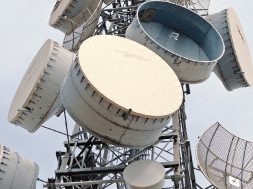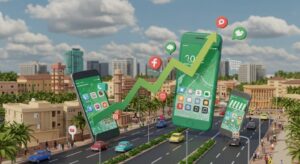Trump Mobile has introduced a differential call tariff regime for Nigeria that will see MTN Nigeria users get the lowest rate among major mobile networks in the country, in a differential tariffing by the newly-launched US telecoms service provider.
Trump Mobile, which was launched today in the US, is a Mobile Virtual Network Operator (MVNO) backed by the family of US President Donald Trump that brands itself as “the international mobile network built for global citizens.”
Technology Times analysis shows that under the new international calling rates released by Trump Mobile, calls to MTN Nigeria lines are capped at 95 minutes, compared to 70 minutes for Airtel Nigeria (formerly Celtel), 90 for Globacom, and 80 for other Nigerian mobile networks.

Rather than applying a flat or uniform rate for all calls into Nigeria unlike other countries it has granted unlimited call caps, Trump Mobile has set varying charges depending on specific factors such as recipient’s network (e.g., MTN, Airtel, Glo); call destination (e.g., local, national, international); geographic region within the same country (e.g., Lagos vs. rural areas) and type of service (e.g., mobile vs. landline).
In contrast, calls to fixed lines into Lagos, Nigeria’s commercial capital, attract a significantly lower offering of 50 minutes, matching the call cap to general Nigerian destinations.
A differential call tariff refers to a pricing system where different rates are charged for making calls to different networks, destinations, or regions. Rather than applying a flat or uniform rate for all calls into Nigeria unlike other countries it has granted unlimited call caps, Trump Mobile has set varying charges depending on specific factors such as recipient’s network (e.g., MTN, Airtel, Glo); call destination (e.g., local, national, international); geographic region within the same country (e.g., Lagos vs. rural areas) and type of service (e.g., mobile vs. landline).
This tariff structure positions MTN Nigeria, the largest mobile operator in the country, as offering the best deal to call on the new Trump Mobile, a move that may influence calling patterns, especially for Nigerians in the diaspora seeking affordable options to connect with family and friends back home.
How does Trump Mobile cap calls into Nigeria?
| Destination (Country) | Max Cap (Minutes) |
|---|---|
| Nigeria | 50 |
| Nigeria – Cellular – Celtel | 70 |
| Nigeria – Cellular – Globacom | 90 |
| Nigeria – Cellular – MTN | 95 |
| Nigeria – Cellular – Other | 80 |
| Nigeria – Lagos | 50 |
| Source: Trump Mobile website. |
Trump Mobile says its mission is to simplify global telecoms with transparent pricing and extensive worldwide reach. The service runs on a cloud SIM model, allowing users to connect to over 200 countries using a single Trump SIM without roaming charges.
While the company has not provided an official reason for the higher MTN calling rates, industry analysts say the price difference may reflect underlying interconnect arrangements or commercial agreements with local carriers.
With over 172 million active mobile subscribers in Nigeria, according to the Nigerian Communications Commission (NCC), international call tariffs remain a critical concern for families, businesses, and the country’s booming digital economy.
Trump Mobile begins pre-orders for T1 Android handset
Trump Mobile has also launched pre-orders for its flagship T1 Android phone, priced at US $499 with a $100 deposit, ahead of its commercial rollout.
The striking gold‑finish handset — the T1 Phone 8002 — sports a 6.8‑inch AMOLED display with a 120 Hz refresh rate, 12 GB RAM, 256 GB storage, and a 50 MP main camera. It also includes a 3.5 mm headphone jack, in‑screen fingerprint sensor, AI face unlock, and 20 W fast‑charging support.
Backed by Trump-branded “The 47 Plan” mobile service, the device aims at a US$47.45 monthly subscription, offering unlimited calls, texts and data — including high-speed for the first 20 GB. The plan also bundles international calling to 100 countries, telemedicine, and roadside assistance, with US-based customer service.
Source of Article

